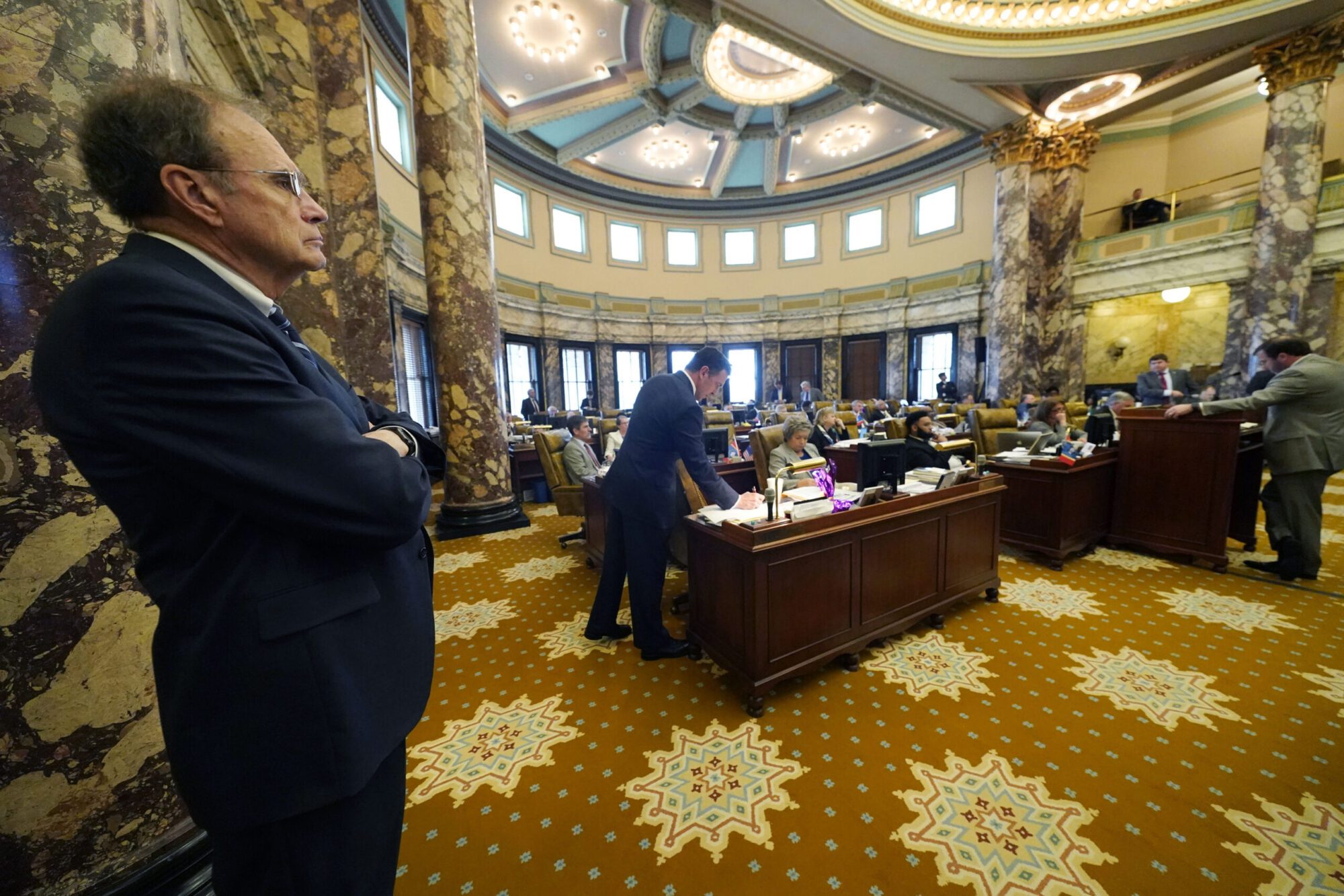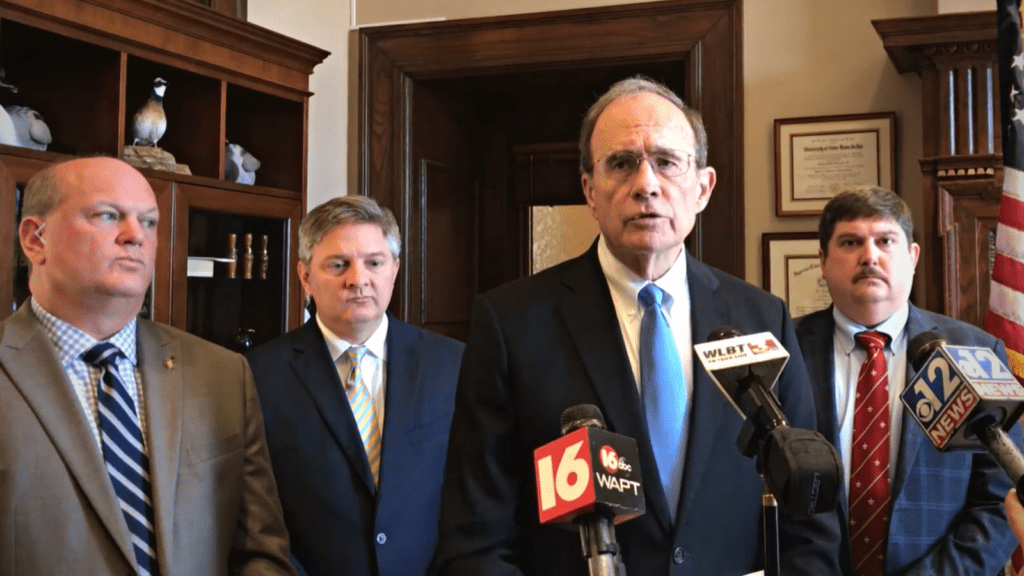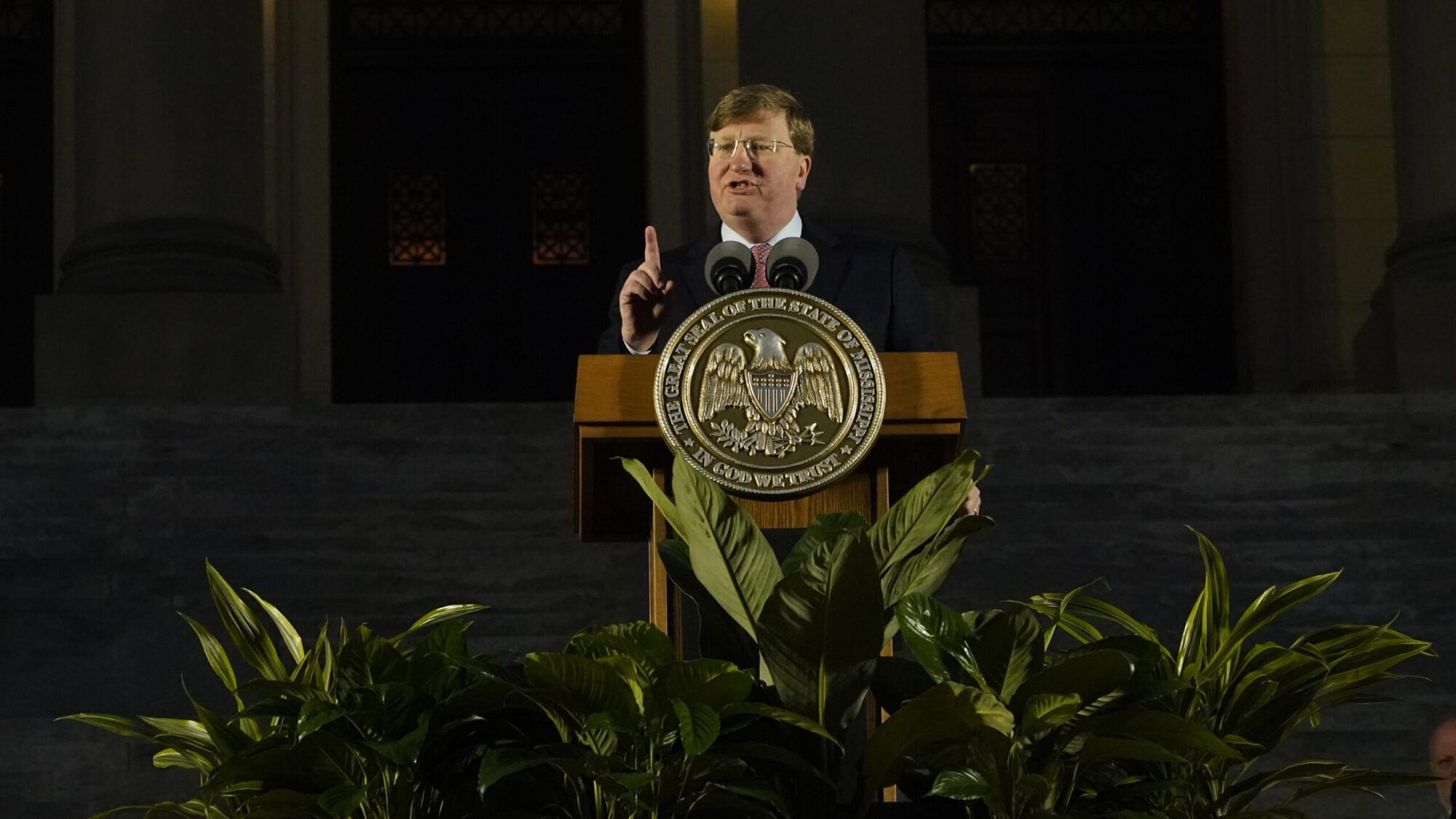
Lt. Gov. Delbert Hosemann listens to debate in the Senate at the Mississippi Capitol in Jackson. (AP Photo/Rogelio V. Solis - March 15, 2022 - Copyright 2022 The Associated Press. All rights reserved.)
Debate centers around the wisdom of increased minimum sentences while others express concerns with increased prison populations.
Last week, Lt. Governor Delbert Hosemann along with State Senators Joey Fillingane, Brice Wiggins and Jeremy England unveiled six bills making their way through the chamber this session that are aimed at curbing crime across Mississippi. Among the bills were increased minimum sentences for certain crimes and stronger penalties for public corruption.
“It is critical to us that we address crime in a manner that is consistent across the state,” Lt. Governor Hosemann said at the press conference announcing the legislation.
Since then, advocacy groups have lined up either in support or opposition to the proposals.
The Mississippi Center for Public Policy (MCPP) is one think tank that expressed support for the Senate bills.
Douglas Carswell, MCPP President and CEO, said in particular, MCPP supports SB 2101 and 2100, which increase minimum sentences, including for carjacking and resisting arrest.
“Three cheers to the Senate. It is great to see tough action on crime,” Douglas Carswell said. “For years, we have been told that Mississippi’s incarceration rates are too high. That is nonsense. Our rate of incarceration might be high as a percentage of the population. It is not high relative to the level of criminality.”
Carswell said the City of Jackson, for example, has perhaps the highest homicide rate of any city in America.
“Minimum sentences for carjacking and resisting arrest are a step forward,” Carswell continued. “We should not be afraid of sending people to prison. Prison works by removing violent felons from society and limiting their ability to commit further harm.”
Grant Callen, Founder and CEO of Empower Mississippi, said policymakers are wise to be concerned about public safety, but it’s critical to focus on those policies that have been demonstrated to deter would be criminals.
“Research and experience have shown that if less crime is the goal, then what matters most is the certainty of apprehension, not the severity of the sentence,” Callen said. “So, I’m especially supportive of those policy proposals that focus most heavily on that ‘certainty of apprehension’ piece.”

The FWD.us Mississippi State Director Alesha Judkins and Mississippi State Director for Right on Crime Scott Peyton expressed their concerns about the proposed bills.
Judkins spoke to those bills that advanced out of committee that would require mandatory minimum sentencing for some offenses. She said those proposals would further increase the state’s dangerously high prison population and hurt public safety.
“Mississippi currently has the highest imprisonment rate in the country. The prison population continues to increase, and it is not making our state safer,” Judkins said. “Proposed mandatory minimum bills that advanced out of the Senate Judiciary B committee would significantly increase the required length of sentence for multiple offenses, at a huge cost to Mississippi taxpayers without improving public safety.”
Judkins said mandatory minimum sentences impose harmful one-size-fits-all sentencing on individuals and remove judicial discretion in sentencing.
“Mandatory minimum sentences also remove incentives for people to participate in rehabilitative programming in prison, which contributes to the overall safety of all people who live and work in them,” Judkins said. “Lawmakers should continue to listen to the overwhelming majority of Mississippi residents who support criminal justice reforms that would truly make us safer and not just increase the population of our nearly overcrowded prisons. It is critical that lawmakers reject proposed legislation that would further worsen our incarceration crisis without making our communities safer.”
Judkins argued that increasing incarceration is the most expensive and least effective path. Instead, she said lawmakers should instead focus on proven, data-driven strategies that actually keep communities safe.
For his part, Right on Crime’s director said he agrees with Senator Wiggins when he says, “Every person in the State of Mississippi wants and deserves a safe community.”
“As a conservative, I believe that the protection of its citizens is a core function of government,” Peyton said. “We’ve seen violent crime rates soar across the nation and here in Mississippi. I applaud the efforts of the legislature this session for addressing rising crime rates and the rise in violent crime. This is a conversation that must continue.”
However, Peyton explained, there is concern about several policies being proposed that will lead to a significant increase in Mississippi’s prison population. The financial cost of those proposals is also in question without offering a commensurate public safety benefit.
“For too long, criminal justice — as a core function of government — has not been held to the same standards of efficiency that conservatives hold other government programs,” Peyton stated. “For example, mandatory minimums are a policy regime promoted by the Federal System in the 80’s and 90’s. As a former law enforcement officer and former probation and parole officer, I’ve uttered the catchy phrase, ‘don’t do the crime, if you don’t want to do the time.’ However, catch phrases don’t make good policy.”
Peyton said conservatives are known for being tough on crime but are only able to accomplish this as an outcome if the policies they implement actually reduce crime. He said it also means demanding the most cost-effective approaches that enhance public safety.
“A clear example is our reliance on prisons, which serve a critical role by incapacitating dangerous offenders and career criminals (the individuals we should be afraid of),” Peyton added. “However, prisons are not the solution for every type of offender, and in some instances, they have the unintended consequence of hardening nonviolent, low-risk offenders—making them a greater risk to the public than when they are released. And 95% of all incarcerated individuals are eventually released.”
Peyton referred to a quote in State Auditor Shad White’s recent article in the Magnolia Tribune. “One of the most robust findings from studying American crime is that more police means less crime,” according to Rafael Mangual.
“The article goes on to outline not only the human cost, but the financial cost to our state as a result of violent crime. Mr. White also stresses following the research to address rising crime. Mr. White is correct, we must adequately fund and increase the presence of our law enforcement,” Peyton said.
Peyton stated that all individuals should be held responsible for their actions. However, current systems that hold individuals for too long and create unnecessary barriers to successful reentry hinder individuals from making amends for their transgressions.
“Evidence-based reforms like those passed in Mississippi in 2014 and 2011, put public safety, personal responsibility, and victims’ rights at the forefront,” Peyton continued. “Lawmakers have the opportunity this session to provide for the safety of all Mississippians by ensuring that policies enacted follow the same conservative principles that have governed other critical areas of state government.”











